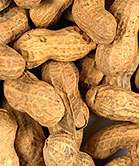(HealthDay)—Infants of a particular generation born in Australia to Asian-born parents appeared to have an increased risk of peanut allergy compared with those of Australian-born parents, according to research published in the December issue of Allergy.
Jennifer J. Koplin, Ph.D., of the University of Melbourne in Australia, and colleagues screened 5,276 infants (74 percent participation) with skin prick tests for peanut allergy. Sensitive infants underwent food challenge.
The researchers found that infants with a parent or parents born in East Asia were more likely to have peanut allergy (odds ratio [OR], 3.4; 95 percent confidence interval [CI], 2.2 to 5.1) than those with two parents born in Australia. Peanut allergy was not more common in infants with a parent or parents born in the United Kingdom or Europe (OR, 0.8; 95 percent CI, 0.4 to 1.5). Interestingly, Asian parents had lower rates of allergic disease. About 30 percent of the increase in peanut allergy among infants of Asian parents was explained by a higher prevalence of eczema, and 18 percent was explained by differences in dog ownership.
"The high peanut allergy prevalence among infants of Asian-born parents appears to have occurred in a single generation and was not present among infants with parents migrating from other countries, suggesting gene-environment interactions are important," the authors write.
More information:
Abstract
Full Text (subscription or payment may be required)
Journal information: Allergy
Copyright © 2014 HealthDay. All rights reserved.



















